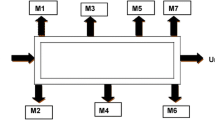Abstract
A new methodology for performance analysis of flexible manufacturing systems (FMSs) with priority scheduling is presented. The analytic model developed extends the mean value analysis of closed networks of queues with multiple product types, various non-preemptive priority service disciplines, and with parallel machine stations. Performance measures derived include the expected throughput per product and per station, utilization of machines and transporters, queuing times and queue length measures for various configurations. Extensive numerical calculations have shown that the algorithm used for solving the problem converges rapidly and retains numerical stability for large models. The paper also illustrates the application of the model to a system with a mixture of FCFS and HOL disciplines which gives insights into various priority assignment policies in FMSs. Special attention was given to the problem of scheduling the robot carriers (transporters).
Similar content being viewed by others
References
Y. Bard, Some extensions to multiclass queuing network analysis, in:Performance of Computer Systems, ed. M. Arato (North-Holland, Amsterdam, 1979).
F. Baskett, K.M. Chandy, R.R. Muntz and F.G. Palacios, Open, closed and mixed networks of queues with different classes of customers, J. ACM 22, 4(1975)248.
P. Bratley, B.L. Fox and L.E. Schrage,A Guide to Simulation (Springer-Verlag, New York, 1983).
R.M. Bryant, A.E. Krzesinski and P. Teunissen, The MVA preempt resume priority approximation,Proc. ACM SIGMETRICS Conf. on Measurement and Modeling of Computer Systems (1983) p. 12.
J.A. Buzacott, Optimal operating rules for automated manufacturing systems, IEEE Trans. Automatic Control 27, 1(1982)80.
J.A. Buzacott and J.G. Shanthikumar, Models for understanding flexible manufacturing systems, AIIE Trans. 12, 4(1980)339.
J.B. Cavaille and D. Dubois, Heuristic methods based on mean value analysis for flexible manufacturing systems,Proc. IEEE Conf. on Decision and Control, Orlando, Florida (1981).
K.M. Chandy and M.S. Lakshmi, An approximation technique for queuing networks with preemptive priority queues, Working Paper (Dept. of Computer Sciences, The University of Texas at Austin, 1984).
A. Cobham, Priority assignment in waiting line problems, Oper. Res. 2, 2(1954)70.
W.J. Gordon and G.F. Newell, Closed queuing systems with exponential servers, Oper. Res. 15, 3(1967)254.
R.R. Hildebrant, Scheduling flexible machinery systems using mean value analysis,Proc. IEEE Conf. on Decision and Control, Alburquerque, New Mexico (1980).
J.R. Jackson, Job-shop-like queuing systems, Management Science 10, 2(1963)131.
J.S. Kaufman, Approximation methods for networks of queues with priorities, Performance Evaluation 4, 1(1984)183.
L. Kleinrock,Queuing Systems, Volume II: Computer Applications (Wiley, New York, 1976).
S.S. Lavenberg, ed.,Computer Performance Modelling Handbook (Academic Press, New York, 1983).
E.D. Lazowska, J. Zahorjan, G.S. Graham and K.C. Sevcik,Quantitative System Performance (Prentice-Hall, Englewood Cliffs, New Jersey, 1984).
M.J.M. Posner and B. Bernholtz, Closed finite queuing networks with time lags, Oper. Res. 16, 12(1968)962.
M. Reiser and S.S. Lavenberg, Mean value analysis of closed multichain queuing networks, J. ACM 27, 4(1980)313.
C.H. Sauer and K.M. Chandy,Computer Systems Performance Modelling (Prentice-Hall, Englewood Cliffs, New Jersey, 1981).
P.J. Schweitzer, Approximate analysis of multiclass closed networks of queues, Int. Conf. on Stochastic Control and Optimization, Free University, Amsterdam (1979).
P.J. Schweitzer, A. Seidmann and S. Shalev-Oren, The correction term in approximate mean value analysis, Letters of Operations Research (1985), to appear.
J.J. Solberg, A mathematical model of computerized manufacturing systems,Proc. 4th Int. Conf. on Production Research, Tokyo, Japan (1977).
K.E. Stecke and J.J. Solberg, Loading and control policies for a flexible manufacturing system, Int. J. of Production Research 19, 5(1981)481.
R. Suri, New techniques for modeling and control of flexible automated manufacturing systems, IFAC Meeting, Kyoto, Japan (1981).
R. Suri, Robustness of queuing network formulas, J. ACM 30, 3(1983)564.
R. Suri and R.R. Hildebrant, Modeling flexible manufacturing systems using mean-value analysis, Journal of Manufacturing Systems 1, 3(1984).
H.A. Taha, Operations Research (Macmillan, New York, 1976).
Author information
Authors and Affiliations
Rights and permissions
About this article
Cite this article
Shalev-Oren, S., Seidmann, A. & Schweitzer, P.J. Analysis of flexible manufacturing systems with priority scheduling: PMVA. Ann Oper Res 3, 113–139 (1985). https://doi.org/10.1007/BF02024742
Issue Date:
DOI: https://doi.org/10.1007/BF02024742




